|
|
|
Sort Order |
|
|
|
Items / Page
|
|
|
|
|
|
|
| Srl | Item |
| 1 |
ID:
188134


|
|
|
|
|
| Summary/Abstract |
The recent US emphasis on a geoeconomic confrontation with China in the developing states could spawn an economic version of the domino theory. Geoeconomic domino theory assumes that if Beijing’s economic influence is not stopped in a developing state, America might witness more developing states incorporated into the Chinese economic orbit. The falling economic domino eventually can reach the developed economies. Nonetheless, there are reasons to expect that the developing economies would not fall to China one after another. China’s gains in the developing regions in material capacity, ability to govern key issue areas, and ideological appeal are also dubious. In conducting geoeconomic competition with China, the United States should concentrate on the developed economies—Western Europe and Northeast Asia—that have a significant impact on the balance of power.
|
|
|
|
|
|
|
|
|
|
|
|
|
|
|
|
| 2 |
ID:
188135
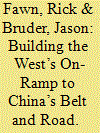

|
|
|
|
|
| Summary/Abstract |
China’s Belt and Road Initiative (BRI) is already changing infrastructure and production across much of the world. The three states of the South Caucasus and their counterparts in Central Asia need diverse connectivity to preserve their economic and political independence amid China’s expanding influence. Despite some rhetoric and practical measures, the United States and the European Union (EU) continue to underestimate the BRI. This article identifies recent international and regional developments that converge to create a unique opportunity for the West and South Caucasus partners. They may develop integrated, long-terms infrastructure of lasting mutual benefit. The convergence of events in and around the South Caucasus offers the place for the West to build an “On-Ramp” to the BRI. The South Caucasus provide a potential gateway into Asia’s heart that is not dictated solely by the priorities of Chinese foreign or commercial policies, just as the Baku-Tbilisi-Ceyhan pipeline of a generation ago served a similar role.
|
|
|
|
|
|
|
|
|
|
|
|
|
|
|
|
| 3 |
ID:
188137
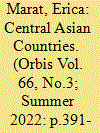

|
|
|
|
|
| Summary/Abstract |
With the withdrawal of the US and coalition forces from Afghanistan and the rapid takeover by the Taliban, most Central Asian governments recognized the Taliban in a pragmatic decision to peacefully coexist with the neighboring extremist regime that will likely remain in power for the foreseeable future. Tajikistan is, however, denying the Taliban recognition and indirectly supporting the resistance movement in Panjshir. The political and human catastrophe in Afghanistan is threatening to boost autocratic tendencies and further deepen political gaps in Central Asian societies. This article discusses the rationale behind each Central Asian government’s approach to the Talibanized Afghanistan and the looming domestic and external challenges to the region.
|
|
|
|
|
|
|
|
|
|
|
|
|
|
|
|
| 4 |
ID:
188138
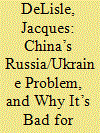

|
|
|
|
|
| Summary/Abstract |
The war in Ukraine, the international responses targeting Russia, and China’s reaction to the conflict point to complex and possibly growing China-related challenges for international order and security, especially in the Indo-Pacific region. On issues of great power diplomacy, state sovereignty, economic sanctions, and the use of military force, the lessons Beijing’s behavior appears to teach and the lessons Beijing may be learning in the context of the Ukraine crisis are complex but mostly bode ill. These Ukraine-related developments are greater causes for concern because they are consistent with, and likely to reinforce, prior trends and patterns in China’s perceptions and behavior.
|
|
|
|
|
|
|
|
|
|
|
|
|
|
|
|
| 5 |
ID:
188131


|
|
|
|
|
| Summary/Abstract |
The sixtieth anniversary of the Cuban missile crisis is an appropriate time to review the events—arguably the closest the world has come to nuclear war—from the perspective of 2022. Growing tensions between Moscow and Washington and increasing Cuba emphasis in US domestic politics preceded the confrontation. Analysts differ on motives for placing long-range missiles in Cuba; Soviet officials consistently emphasized the defense of the island. We know now that nuclear war was even closer than realized at the time. This article is a revision of one that appeared in the Winter 2013 issue.
|
|
|
|
|
|
|
|
|
|
|
|
|
|
|
|
| 6 |
ID:
188139


|
|
|
|
|
| Summary/Abstract |
The repercussions of Russia’s invasion of Ukraine are reverberating around the world. The multilateral and coordinated response of the international community to Russia’s unprovoked war in Ukraine was immediate and has been waged on multiple fronts. While the world’s major powers are focused on the best strategies to face the ongoing conflict, international humanitarian law and human rights law are violated every day in Ukraine. Innocent civilians are tortured, killed, or obliged to leave their city or country to avoid the worst atrocities, while civilian buildings and infrastructure are destroyed. This article examines the most relevant decisions adopted at the international level and identifies possible solutions to prosecute and punish international crimes perpetrated in Ukraine. International (criminal) law and cooperation between states and international organizations will play a crucial role in the fight against impunity for those responsible for the worst atrocities against the Ukrainian population.
|
|
|
|
|
|
|
|
|
|
|
|
|
|
|
|
| 7 |
ID:
188133
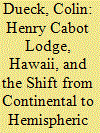

|
|
|
|
|
| Summary/Abstract |
Over the course of the 1890s, the United States shifted from a continental defense model toward a hemispheric one. Senator Henry Cabot Lodge (R-MA) was a leading proponent of this shift. Lodge was convinced that the United States needed to build a blue-water navy, acquire maritime bases overseas, establish its predominance in Central America, and push US influence out into the Pacific. The first test of this vision came not against Spain or Germany in the Caribbean, but against the possibility of British and Japanese influence over Hawaii in 1894–95. Domestic political and economic considerations acted mainly as a constraint on Lodge’s vision rather than as a basis for it. The main impetus was strategic, as he looked to safeguard an extended security zone for the United States in Atlantic, Pacific, and Caribbean waters. As he put it, “I would take and hold the outworks, as we now hold the citadel, of American power.”
|
|
|
|
|
|
|
|
|
|
|
|
|
|
|
|
| 8 |
ID:
188132
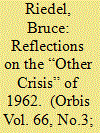

|
|
|
|
|
| Summary/Abstract |
John F. Kennedy confronted a second major crisis in 1962: the Chinese invasion of India, which threatened the territorial integrity of the world’s largest democracy. India appealed for and received US military aid in a major airlift. Kennedy also constrained Pakistan from opening a second front against India. At the peak of the crisis, India appealed for direct American military intervention against China. The 1962 crisis still resonates; the border is in dispute, fueling a trilateral arms race.
|
|
|
|
|
|
|
|
|
|
|
|
|
|
|
|
| 9 |
ID:
188136
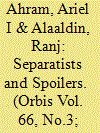

|
|
|
|
|
| Summary/Abstract |
This article examines the United Arab Emirates’ (UAE’s) involvement in proxy warfare in the Middle East and the Horn of Africa. The UAE’s security posture in these volatile regions has evolved remarkably over the last two decades and set the Emirates apart from many of its rivals, peers, and neighbors, such as Qatar, Saudi Arabia, and Turkey. Most countries have intervened in conflicts in order to affect politics in the center, either by backing pro-government militias or center-seeking rebel groups. The UAE, in contrast, has constructed a portfolio of proxy relationships mostly with separatist groups. Such groups operate in far flung peripheral territories of countries like Yemen, Iraq, Syria, and Somalia. They do not seek to seize the state, but to break away from it. This approach to proxy warfare has granted the UAE unique negative control at relatively little cost. Through its proxy networks, the UAE can impede adversaries from consolidating control across the Indian Ocean littoral and maintain influence in the key maritime passages to Europe and Asia.
|
|
|
|
|
|
|
|
|
|
|
|
|
|
|
|
|
|
|
|
|